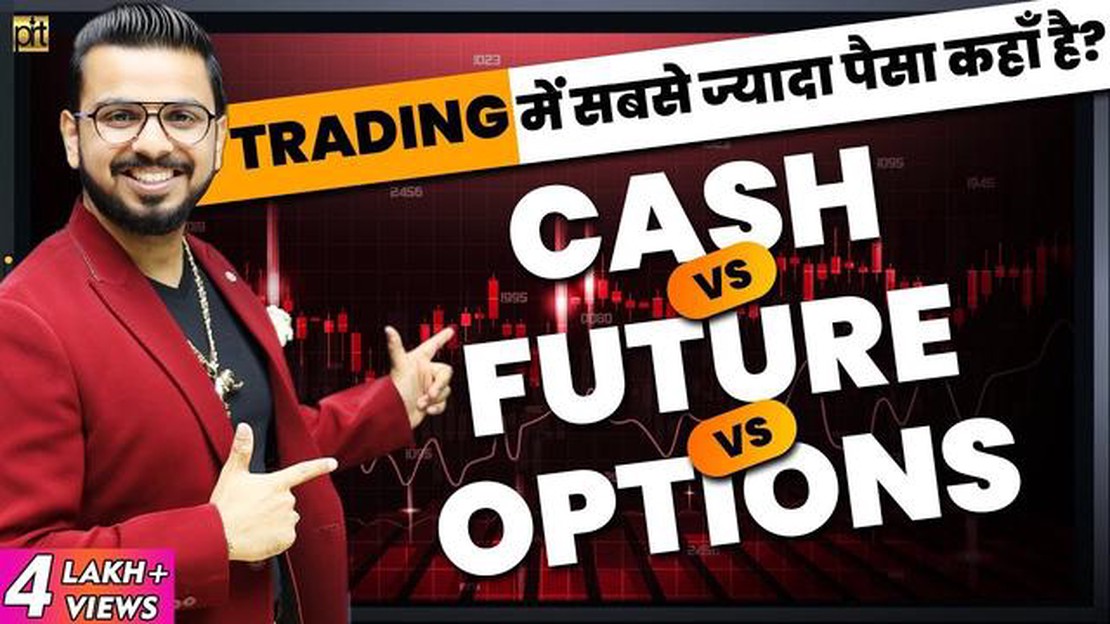What is the Right Amount of Risk for Binary Options Trading?
How much to risk in binary options? Binary options trading is a popular form of investment that allows individuals to potentially earn high returns on …
Read Article
In the world of financial markets, there are various investment opportunities available to traders. Two popular instruments that traders often encounter are futures and options. While both futures and options allow traders to speculate on the future price movements of assets, they differ in significant ways. Understanding these differences is crucial for traders looking to make informed investment decisions.
Futures trading involves an agreement between two parties to buy or sell an underlying asset at a predetermined price and date in the future. The buyer of a futures contract is obligated to buy the asset, while the seller is obligated to sell it. This type of trading offers traders the potential for significant leverage, as they can control a larger position with a smaller investment. However, it also exposes traders to higher risks, as they are obligated to fulfill the contract regardless of the asset’s market value at the time of expiration.
Options trading, on the other hand, grants traders the right, but not the obligation, to buy or sell an underlying asset at a predetermined price and date. This type of trading allows traders to speculate on the price movements of the asset without the same level of risk as futures trading. Traders can choose to exercise their options if the market moves in their favor, but they are not obligated to do so. This flexibility is one of the primary advantages of options trading, as it allows traders to limit their potential losses.
While both futures and options trading can be profitable, they require a deep understanding of the market and careful risk management. Traders must consider their risk tolerance, investment goals, and trading strategies when choosing between futures and options. By understanding the fundamental differences between these two instruments, traders can make informed decisions that align with their financial objectives.
Read Also: What is the current value of a dollar?
Future trading involves the buying and selling of contracts, known as futures contracts, that obligate the buyer to purchase an asset or the seller to sell an asset at a future date and predetermined price. Here are some key concepts to understand when it comes to future trading:
| Futures Contract | A futures contract is a standardized agreement between two parties to buy or sell an asset at a specific price and date in the future. |
| Margin | Margin refers to the initial amount of money or collateral that traders must deposit with their broker to open a futures position. |
| Leverage | Leverage is the ability to control a large position with a small amount of capital. Futures trading offers high leverage, allowing traders to amplify potential profits and losses. |
| Long and Short Positions | A long position involves buying a futures contract with the expectation that the price will increase, while a short position involves selling a futures contract with the expectation that the price will decrease. |
| Settlement | Settlement refers to the process of closing out a futures contract by either physical delivery of the underlying asset or a cash settlement. |
| Hedging and Speculation | Futures trading can be used for hedging or speculation. Hedging involves reducing risk by taking an offsetting position in the futures market, while speculation involves taking on risk to potentially profit from price movements. |
Understanding these key concepts is essential for successful future trading. It is important to carefully analyze market conditions, manage risk, and stay informed about the factors that could influence future prices.
Before exploring the differences between future trading and options trading, it’s important to understand the basics of each trading method.
Future Trading:
Options Trading:
By understanding the basics of future trading and options trading, investors can better grasp the key differences between the two methods and determine which trading strategy may be more suitable for their investment goals.
Future trading is a type of investment strategy where traders buy and sell contracts that guarantee the purchase or sale of an asset at a predetermined price and date in the future.
Read Also: Gold Price in Singapore Today - Current Rates and Trends
Options trading is a type of investment strategy where traders buy and sell contracts that give them the right, but not the obligation, to buy or sell an asset at a predetermined price and date in the future.
The main difference between future trading and options trading is that future contracts guarantee both the purchase or sale of an asset, while options contracts only give the right, but not the obligation, to buy or sell an asset.
Both future trading and options trading carry a certain level of risk, but options trading is generally considered to be more risky because traders can lose the entire premium paid for the options contract if the market moves against their position.
How much to risk in binary options? Binary options trading is a popular form of investment that allows individuals to potentially earn high returns on …
Read ArticleUnderstanding Stock Market Fundamental Analysis Welcome to our comprehensive guide on understanding stock market fundamental analysis. In the world of …
Read ArticleCan you buy put options before ex-dividend date? Put options are a type of financial derivative that give the holder the right, but not the …
Read ArticleChoosing the Best Software for Trading Trading in today’s fast-paced financial markets requires sophisticated and reliable software. With so many …
Read ArticleCurrent Import Dollar Rate Today Are you planning to import goods from another country? One of the key factors to consider is the current dollar rate …
Read ArticleIs XM broker legal in India? XM Broker is a popular online trading platform that offers a wide range of financial instruments, including forex, …
Read Article